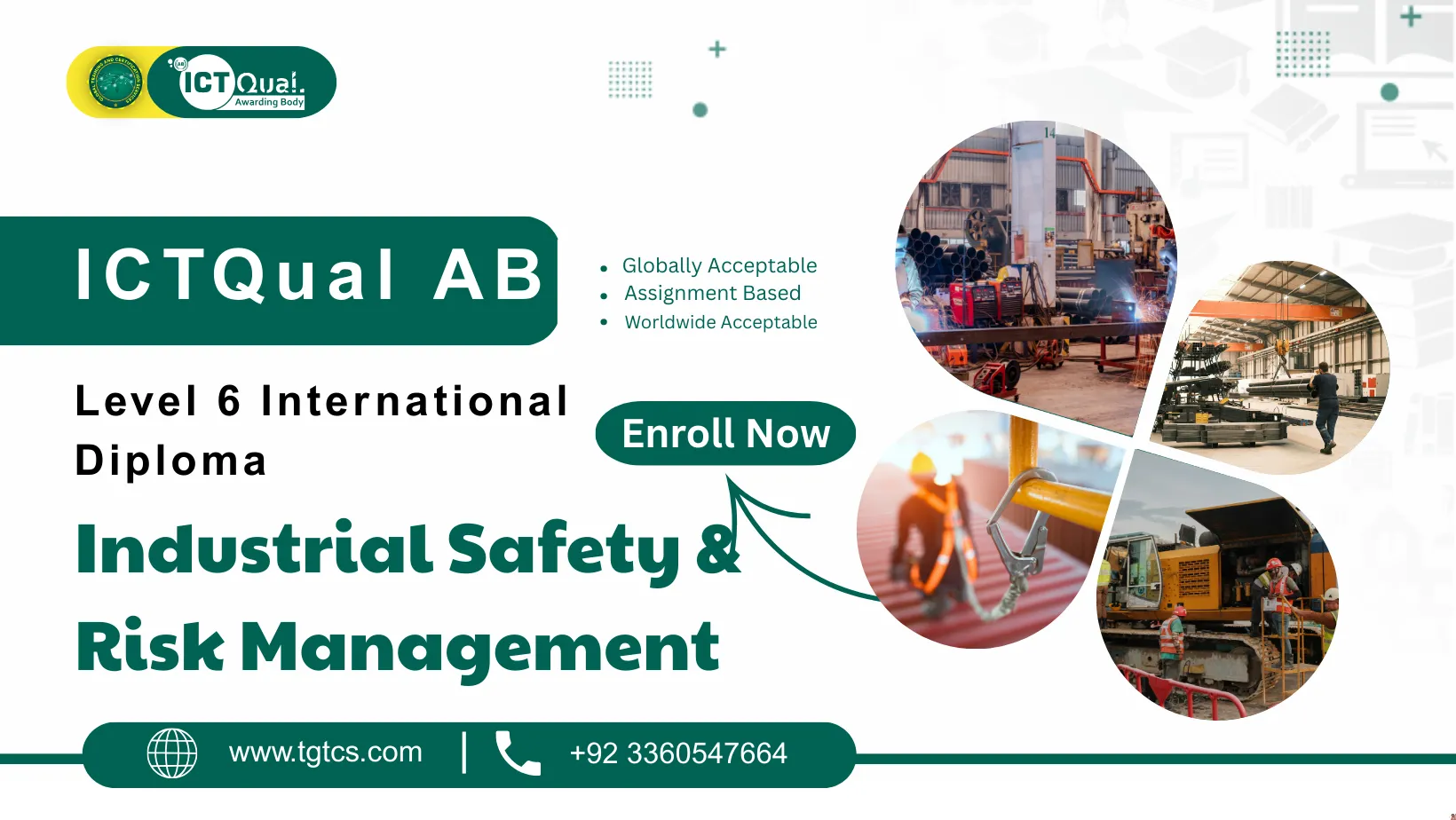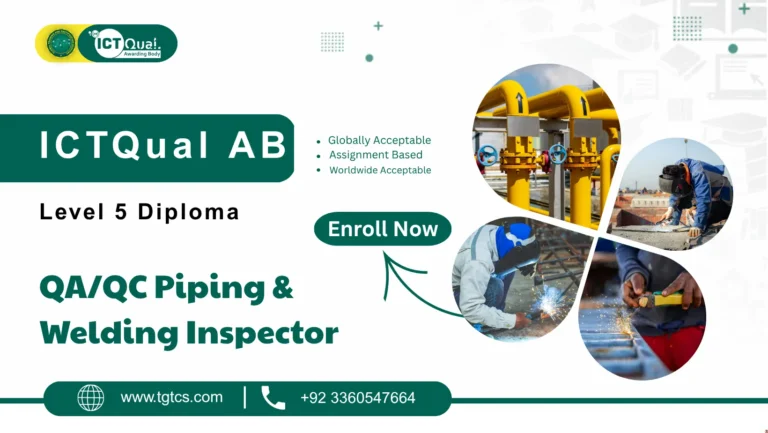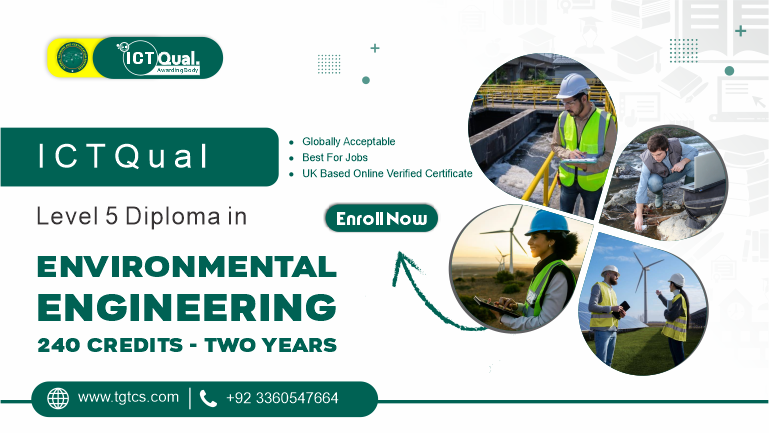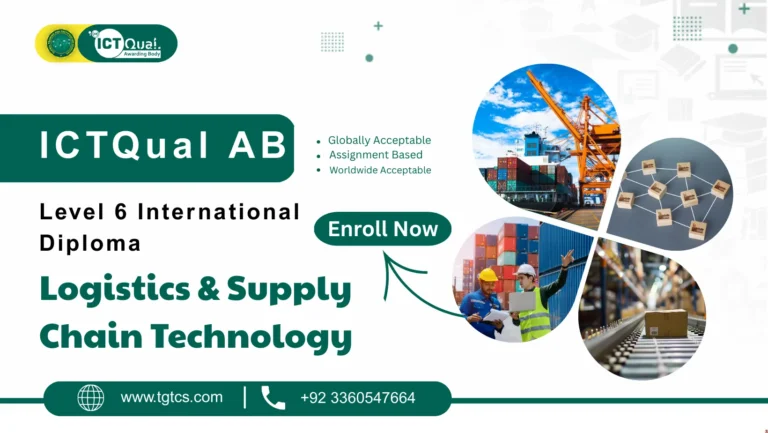ICTQual AB Level 6 International Diploma in Industrial Safety & Risk Management
The ICTQual AB Level 6 International Diploma in Industrial Safety & Risk Management is a globally recognized qualification designed to equip professionals with advanced knowledge and practical expertise in industrial safety, hazard control, and risk management. In today’s rapidly evolving industrial landscape, workplace safety and risk mitigation are critical for operational efficiency, regulatory compliance, and employee well-being. This diploma empowers learners to implement robust safety protocols, conduct comprehensive risk assessments, and lead safety management initiatives across diverse industrial sectors.
This comprehensive program covers the full spectrum of industrial safety and risk management, including hazard identification, emergency preparedness, safety audits, compliance with international standards, and strategic risk control. Learners will gain an in-depth understanding of safety regulations, industrial processes, and emerging trends in occupational risk management, enabling them to make informed decisions that minimize hazards and enhance workplace safety culture.
By completing this diploma, learners will acquire advanced skills in industrial risk assessment, safety program development, and leadership in safety management. Practical applications include designing safety protocols, managing emergency response strategies, conducting safety audits, and implementing digital safety tools and analytics for continuous monitoring. The program also emphasizes professional competencies such as strategic planning, ethical decision-making, and compliance with ISO standards.
Enroll in this diploma to become a certified expert in industrial safety and risk management, prepared to lead safety initiatives, ensure compliance, and drive operational excellence in any industrial environment.
The Global Training and Certification Services is Approved Training Centre of ICTQual AB UK Ltd
Course Level and Credits
Level 6 International Diploma, 360 credits.
Suitable for safety professionals, engineers, managers, and students seeking advanced knowledge in industrial safety and risk management.
Mode of Study
Fully assignment-based; learn at your own pace.
Accessible from anywhere in the world, flexible for working professionals.
Global Recognition & Attestation
British Council verifiable, MOFA and Embassy attested.
Recognized for career advancement, employment, and iqama approval in Gulf countries.
Scope and Purpose
Comprehensive coverage of industrial safety, risk assessment, hazard management, and emergency preparedness.
Focus on both theoretical understanding and practical application in real-world industrial environments.
Skills and Knowledge Gained
Advanced industrial risk management, hazard identification, and emergency response planning.
Leadership and strategic decision-making skills for safety management in multinational industrial operations.
Compliance with international safety standards including ISO 45001.
Use of digital safety tools, audits, and data-driven safety analytics.
Career Benefits
Opens opportunities in industrial safety management, risk consultancy, oil and gas, construction, manufacturing, and corporate safety leadership roles.
Enhances professional credibility, employability, and eligibility for iqama approval in Gulf countries.
Target Audience
Safety officers, engineers, industrial managers, consultants, and students aiming for careers in workplace safety and risk management.
Unique Selling Points (USPs)
Flexible self-paced study, fully assignment-based.
Prestigious and globally recognized Level 6 diploma.
Ideal for international job opportunities and iqama approval.
Mandatory Unit
This qualification, the ICTQual AB Level 6 International Diploma in Industrial Safety & Risk Management , consists of 36 mandatory units.
Year 1 – Foundation of Industrial Safety & Risk Management
- Principles of Industrial Safety Management
- Introduction to Risk Management in Industrial Environments
- Occupational Health and Industrial Hygiene Fundamentals
- Workplace Hazards Identification and Control Measures
- Safety Legislation and Regulatory Compliance
- Fire Safety and Emergency Preparedness
- Manual Handling and Ergonomic Safety
- Communication and Reporting in Safety Management
- Introduction to Environmental Safety and Sustainability
- Electrical and Mechanical Safety Awareness
- Incident Investigation and Root Cause Analysis
- Professional Ethics and Responsibility in Safety Practice
Year 2 – Applied Industrial Safety & Risk Management
- Advanced Risk Assessment and Hazard Control
- Safety Performance Monitoring and Auditing
- Process Safety Management and Hazardous Substances
- Industrial Safety in Manufacturing and Heavy Industries
- Safety Management in Construction and Energy Sectors
- Occupational Diseases and Preventive Measures
- Behavioural Safety and Human Factors
- Safety Culture Development and Change Management
- Safety Technology and Digital Tools
- Emergency Response Planning and Crisis Management
- Legal and Regulatory Frameworks (International Perspective)
- Research Methods and Data Analysis for Safety Management
Year 3 – Strategic Leadership in Industrial Safety & Risk Management
- Strategic Safety Leadership and Governance
- Integrated Management Systems (ISO 45001, ISO 14001, ISO 9001)
- Business Risk Management and Sustainability
- Advanced Occupational Health & Wellbeing Strategies
- Safety in Large-Scale Industrial Projects
- Corporate Social Responsibility and Ethical Safety Practices
- International Standards and Global Safety Frameworks
- Digital Transformation and Emerging Trends in Safety
- Policy Development and Implementation in Safety Management
- Research Project / Dissertation in Industrial Safety
- Professional Development and Lifelong Learning
- Capstone Project: Practical Application of Safety Leadership
Start your journey to becoming a globally recognized expert in industrial safety and risk management with the ICTQual AB Level 6 International Diploma.
Year 1 – Foundation of Industrial Safety & Risk Management
Principles of Industrial Safety Management
- Understand the core principles and objectives of industrial safety management.
- Apply safety management systems to prevent accidents and workplace risks.
- Evaluate organizational responsibilities in maintaining safety standards.
- Develop awareness of global best practices in industrial safety.
Introduction to Risk Management in Industrial Environments
- Define and explain key risk management concepts in industrial settings.
- Identify and analyze risks using structured assessment methods.
- Apply preventive and corrective measures for risk mitigation.
- Demonstrate the importance of proactive risk management in operations.
Occupational Health and Industrial Hygiene Fundamentals
- Recognize occupational health hazards affecting worker wellbeing.
- Apply industrial hygiene principles to control exposure risks.
- Understand monitoring techniques for workplace pollutants.
- Evaluate preventive measures for maintaining occupational health.
Workplace Hazards Identification and Control Measures
- Identify common physical, chemical, and biological workplace hazards.
- Apply effective control measures to minimize hazard exposure.
- Use risk assessment tools to evaluate workplace safety levels.
- Promote safe working practices through hazard awareness.
Safety Legislation and Regulatory Compliance
- Interpret international safety regulations and compliance frameworks.
- Apply legal obligations to industrial safety practices.
- Monitor workplace safety compliance with statutory requirements.
- Understand the role of governance in safety regulation.
Fire Safety and Emergency Preparedness
- Understand fire prevention methods and emergency planning.
- Identify causes of fire hazards in industrial operations.
- Apply evacuation and emergency response procedures.
- Use fire protection systems and safety equipment effectively.
Manual Handling and Ergonomic Safety
- Understand ergonomic risks and their impact on worker health.
- Apply safe manual handling techniques in the workplace.
- Assess ergonomic designs to reduce strain and injury.
- Implement workplace ergonomics programs for efficiency.
Communication and Reporting in Safety Management
- Develop effective safety communication strategies.
- Prepare accurate reports on incidents and safety audits.
- Promote a culture of safety through training and awareness.
- Use documentation tools for regulatory compliance.
Introduction to Environmental Safety and Sustainability
- Recognize environmental risks in industrial activities.
- Apply sustainable practices in safety management.
- Understand environmental safety standards and policies.
- Evaluate the role of sustainability in industrial growth.
Electrical and Mechanical Safety Awareness
- Identify hazards associated with electrical and mechanical systems.
- Apply preventive measures to ensure system safety.
- Understand lockout/tagout and machine guarding procedures.
- Promote safe operations in electrical and mechanical environments.
Incident Investigation and Root Cause Analysis
- Understand procedures for investigating workplace incidents.
- Identify root causes of accidents using structured techniques.
- Apply corrective and preventive actions after incident analysis.
- Enhance organizational learning from safety failures.
Professional Ethics and Responsibility in Safety Practice
- Demonstrate integrity in industrial safety decision-making.
- Recognize the importance of ethics in safety management.
- Apply professional codes of conduct in workplace safety.
- Promote accountability in managing safety risks.
Year 2 – Applied Industrial Safety & Risk Management
Advanced Risk Assessment and Hazard Control
- Conduct comprehensive risk assessments for complex industrial environments.
- Apply advanced hazard control techniques to mitigate workplace risks.
- Evaluate risk prioritization strategies for effective safety planning.
- Develop proactive risk management plans for high-risk operations.
Safety Performance Monitoring and Auditing
- Implement safety monitoring systems to track compliance and performance.
- Conduct workplace audits and inspections according to industry standards.
- Analyze audit results to improve safety processes and protocols.
- Recommend corrective actions based on performance evaluation.
Process Safety Management and Hazardous Substances
- Understand principles of process safety management (PSM) in industries.
- Identify hazards associated with chemicals, gases, and flammable materials.
- Apply control measures to prevent process-related accidents.
- Ensure compliance with PSM regulations and best practices.
Industrial Safety in Manufacturing and Heavy Industries
- Assess and manage risks in manufacturing and heavy industry operations.
- Implement safety protocols for machinery, equipment, and production processes.
- Monitor compliance with industrial safety standards.
- Promote a proactive safety culture among industrial workers.
Safety Management in Construction and Energy Sectors
- Identify risks unique to construction sites and energy facilities.
- Apply safety management systems in high-risk industrial sectors.
- Develop and enforce site-specific safety plans and procedures.
- Monitor safety compliance and emergency preparedness in projects.
Occupational Diseases and Preventive Measures
- Recognize common occupational diseases and their workplace causes.
- Implement preventive strategies to reduce exposure risks.
- Apply health surveillance and monitoring systems for employees.
- Promote wellbeing and occupational health awareness programs.
Behavioural Safety and Human Factors
- Understand the influence of human behavior on safety performance.
- Apply behavioral safety strategies to improve workplace practices.
- Analyze human factors contributing to accidents and near-misses.
- Foster a safety-conscious organizational culture.
Safety Culture Development and Change Management
- Develop strategies to build and sustain a positive safety culture.
- Implement change management principles for safety improvement initiatives.
- Engage employees in safety programs through leadership and training.
- Measure effectiveness of culture transformation and adjust programs.
Safety Technology and Digital Tools
- Utilize digital tools for safety monitoring, reporting, and analysis.
- Apply technology for hazard detection and predictive risk management.
- Integrate safety software and systems into industrial operations.
- Leverage emerging tech trends to enhance safety efficiency.
Emergency Response Planning and Crisis Management
- Develop emergency response plans for industrial incidents.
- Conduct crisis simulations and drills for workforce preparedness.
- Implement communication and coordination strategies during emergencies.
- Evaluate response effectiveness and improve future planning.
Legal and Regulatory Frameworks (International Perspective)
- Understand international safety laws, standards, and regulations.
- Apply global compliance requirements in workplace safety practices.
- Analyze the impact of legislation on industrial operations.
- Ensure safety programs align with international legal frameworks.
Research Methods and Data Analysis for Safety Management
- Conduct applied research on industrial safety topics.
- Analyze safety data to inform risk management decisions.
- Use statistical and analytical tools to assess safety performance.
- Prepare reports and recommendations based on evidence-based research.
Year 3 – Strategic Leadership in Industrial Safety & Risk Management
Strategic Safety Leadership and Governance
- Develop and implement strategic safety policies across organizations.
- Lead safety governance initiatives to ensure regulatory compliance.
- Promote accountability and responsibility in safety leadership roles.
- Align safety objectives with organizational goals and business strategy.
Integrated Management Systems (ISO 45001, ISO 14001, ISO 9001)
- Understand principles of integrated management systems for safety, quality, and environment.
- Apply ISO standards to improve organizational safety and compliance.
- Integrate safety management with operational processes and corporate policies.
- Monitor and evaluate system effectiveness through audits and reporting.
Business Risk Management and Sustainability
- Analyze industrial risks from a strategic and organizational perspective.
- Develop risk mitigation strategies supporting business continuity and sustainability.
- Implement proactive measures to balance operational efficiency with safety.
- Promote sustainable safety practices that reduce environmental and operational impacts.
Advanced Occupational Health & Wellbeing Strategies
- Design workplace programs to enhance occupational health and employee wellbeing.
- Implement policies addressing mental, physical, and ergonomic health concerns.
- Monitor the effectiveness of health initiatives and adapt programs accordingly.
- Foster a safe and supportive work environment through leadership and training.
Safety in Large-Scale Industrial Projects
- Assess hazards in large-scale industrial and construction projects.
- Implement safety planning, monitoring, and control strategies for complex operations.
- Coordinate multidisciplinary teams to maintain consistent safety standards.
- Evaluate project-specific risks and develop contingency measures.
Corporate Social Responsibility and Ethical Safety Practices
- Integrate corporate social responsibility principles into safety programs.
- Promote ethical decision-making and accountability in safety management.
- Evaluate social, environmental, and ethical impacts of industrial operations.
- Ensure compliance with ethical standards and industry best practices.
International Standards and Global Safety Frameworks
- Understand international safety frameworks and benchmarking practices.
- Apply global safety standards to local and multinational industrial operations.
- Monitor and maintain compliance with international regulations.
- Develop policies aligned with global best practices in industrial safety.
Digital Transformation and Emerging Trends in Safety
- Utilize advanced digital tools for safety monitoring, reporting, and analytics.
- Apply Industry 4.0 technologies in industrial risk and safety management.
- Monitor emerging trends in safety technology and integrate them effectively.
- Innovate safety practices through data-driven and automated solutions.
Policy Development and Implementation in Safety Management
- Design comprehensive safety policies tailored to industrial contexts.
- Implement policies effectively across organizational levels.
- Evaluate and revise safety policies based on performance and compliance.
- Ensure continuous improvement through structured policy review and feedback.
Research Project / Dissertation in Industrial Safety
- Conduct in-depth research on advanced safety and risk management topics.
- Analyze data to draw evidence-based conclusions and recommendations.
- Prepare professional research reports suitable for industrial application.
- Present findings to stakeholders, demonstrating practical safety solutions.
Professional Development and Lifelong Learning
- Develop a personal growth plan aligned with industrial safety leadership roles.
- Engage in continuous learning to stay updated with industry trends.
- Reflect on professional performance to identify improvement opportunities.
- Build networks and collaborations to enhance career advancement.
Capstone Project: Practical Application of Safety Leadership
- Apply theoretical knowledge to real-world industrial safety challenges.
- Plan, execute, and evaluate a comprehensive safety management project.
- Demonstrate leadership, risk assessment, and problem-solving skills.
- Present project outcomes showcasing strategic impact on organizational safety.
The ICTQual AB Level 6 International Diploma in Industrial Safety & Risk Management equips learners with advanced knowledge and practical skills to lead safety initiatives and mitigate risks in diverse industrial environments.
Career Advancement Opportunities
- Opens pathways to senior roles in industrial safety, risk consultancy, and occupational health management.
- Enhances employability in multinational corporations, construction, manufacturing, oil & gas, and energy sectors.
Leadership and Strategic Skills
- Develops strategic decision-making abilities to manage complex safety operations.
- Equips learners with skills to implement integrated management systems and safety governance frameworks.
Regulatory Compliance and Global Recognition
- Ensures mastery of international safety standards such as ISO 45001, ISO 14001, and ISO 9001.
- Certification is British Council verifiable, MOFA and Embassy attested, and recognized for iqama approval in Gulf countries.
Practical Knowledge and Technological Expertise
- Learn to apply digital tools, safety analytics, and emerging technologies for effective risk management.
- Gain hands-on skills in emergency planning, incident investigation, and process safety management.
Personal and Professional Development
- Enhances professional credibility and positions learners as industry experts in occupational and industrial safety.
- Supports lifelong learning and continuous improvement in safety leadership roles.
This course ensures learners are fully prepared to lead, innovate, and implement world-class industrial safety and risk management strategies in any global industrial environment.
Start your career transformation with a diploma designed for aspiring leaders and professionals in industrial safety and risk management. This qualification equips learners with practical skills, strategic knowledge, and international recognition to excel in diverse industrial environments.
Safety Professionals and HSE Officers
- Enhance expertise in industrial safety management and risk mitigation.
- Gain advanced skills to lead workplace safety initiatives and compliance programs.
Industrial Engineers and Project Managers
- Apply safety and risk management principles to complex industrial projects.
- Integrate occupational health and safety practices into engineering and operational workflows.
Construction, Manufacturing, and Energy Sector Employees
- Acquire knowledge to manage hazards and ensure regulatory compliance on-site.
- Develop capabilities to implement safety culture and emergency response strategies.
Health and Safety Consultants
- Strengthen consultancy skills with strategic safety leadership and global standards knowledge.
- Advise organizations on risk assessments, safety audits, and policy development.
Career Changers and Aspiring Leaders
- Transition into high-demand roles in occupational and industrial safety.
- Build credibility for international employment and iqama approval in Gulf countries.
This diploma prepares learners to become globally recognized experts, capable of leading, innovating, and implementing world-class industrial safety and risk management practices.
Course Overview
Course Level
Level 6
Course Units
36 Units
Credits
360
Duration
3 years






